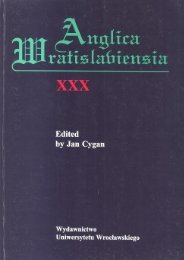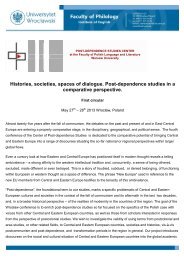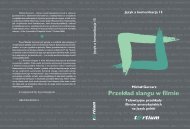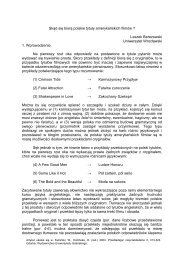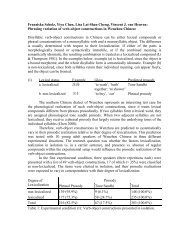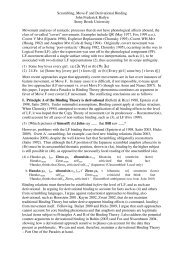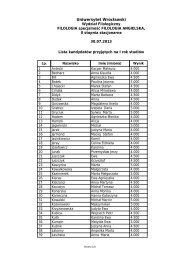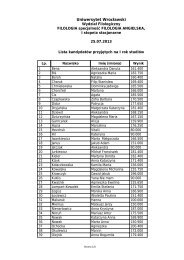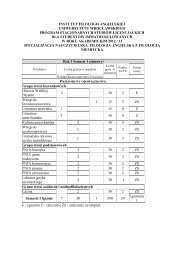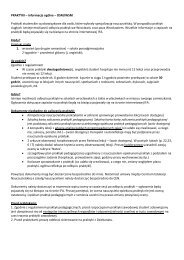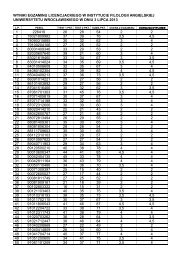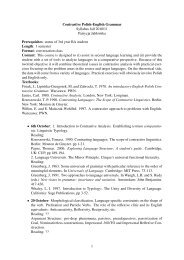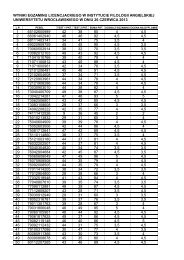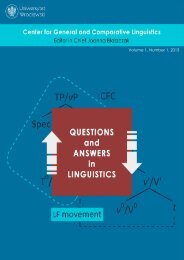Academic Journal Modern Philology
Academic Journal Modern Philology
Academic Journal Modern Philology
You also want an ePaper? Increase the reach of your titles
YUMPU automatically turns print PDFs into web optimized ePapers that Google loves.
Old Frisian and Anglo-Saxon Legal Texts. A Stylistic Comparison<br />
of the law, we can read its bare form: “If one demands land from somebody, let the elder in the house say:<br />
that land for which you bring me before the Thing and demand from me, I bought it” (O’Donnell 1998:<br />
247). Such a dramatized law and the whole procedure gives plenty of indication that it was intended to be<br />
read and understood far more generally than its detail would suggest. Similar style is visible in the Second<br />
land-law too. The law gives certain conditions on which a mother can sell an inheritance of the child who<br />
still has not reached the age of adolescence. The law is transferred into a kind of dramatic story with a<br />
suspense. Even though the reader can decipher the regular, universal meaning of the act (that a child has<br />
right to approve the actions of his mother when he comes of age, except when the mother was trying to<br />
support the stable future of the child) with no difficulty, still the so called “three needs” of the child are<br />
to be interpreted in a more general way, as it simple could happen very rarely if not never that a child<br />
would starve, the freezing wind would kill the wild animals and so on (Sterringa 1998: 291). Seventeen<br />
statutes also use similar stylistic level of sophistication. In the 7 th statute one can find the procedure that<br />
should be followed in a situation when “a man flees with a woman through three houses and a church.”<br />
That visualized description does not prevent the reader from general understanding of the particular law,<br />
however.<br />
When we compare the two styles of the Anglo-Saxon and Old Frisian legal texts we can clearly<br />
state that in Old Frisian texts, there is this predominant preference of the specific over general, whereas<br />
in Anglo-Saxon it is the other way round. Here, the legal declarations are rather proscriptive then<br />
prescriptive, and the language tends to be balanced and formal. What also should be added, is that as far as<br />
Old Frisian legal texts are concerned, they can be written in the third person, when they give a situational<br />
description, second person monologues (in case of the oaths of office – where the text is to be read by<br />
the representative of the administration) and first person complaints put into the legal message. When we<br />
compare it with the English legal texts, such situations are impossible, unless we talk about a monologue<br />
in the introduction, or the words directed to God.<br />
Even if we analyze only such small amount of data, we can still find the major differences between<br />
the legal texts of Anglo-Saxon and Old Frisian communities. The sentences presenting the main legal<br />
points are constructed in a similar way, nevertheless, their stylistic and lexical composition is slightly<br />
different. Furthermore, the text types used in the Old Frisian legal acts are much more complex than in<br />
Anglo-Saxon legal codes, as they can be freely mixed to achieve the writer’s aim.<br />
11<br />
References<br />
Attenborough, Frederick Levi (1922) The Laws of the Earliest English Kings. Cambridge: Cambridge University<br />
Press.<br />
Bautkan, Dirk (1996) A Concise Grammar of the Old Frisian Dialect of the First Riustring Manuscript. (NOWELE<br />
Supplement, 16). Odense: Odense University Press.<br />
Bremmer, Rolf Hans (1998) Approaches to Old Frisian <strong>Philology</strong>. (Amsterdamer Beiträge zur Älteren<br />
Germanistic). Amsterdam: Rodopi.<br />
Milton, Haight Turk ([1893] 1998) The Legal Code of Alfred the Great. Halle: Max Niemayer Verlag. Daniel<br />
P. O’Donnell Literary Embellishment in Old Frisian Legal Texts, Approaches to Old Frisian <strong>Philology</strong>.<br />
(Amsterdamer Beiträge zur Älteren Germanistic). Amsterdam: Rodopi.



